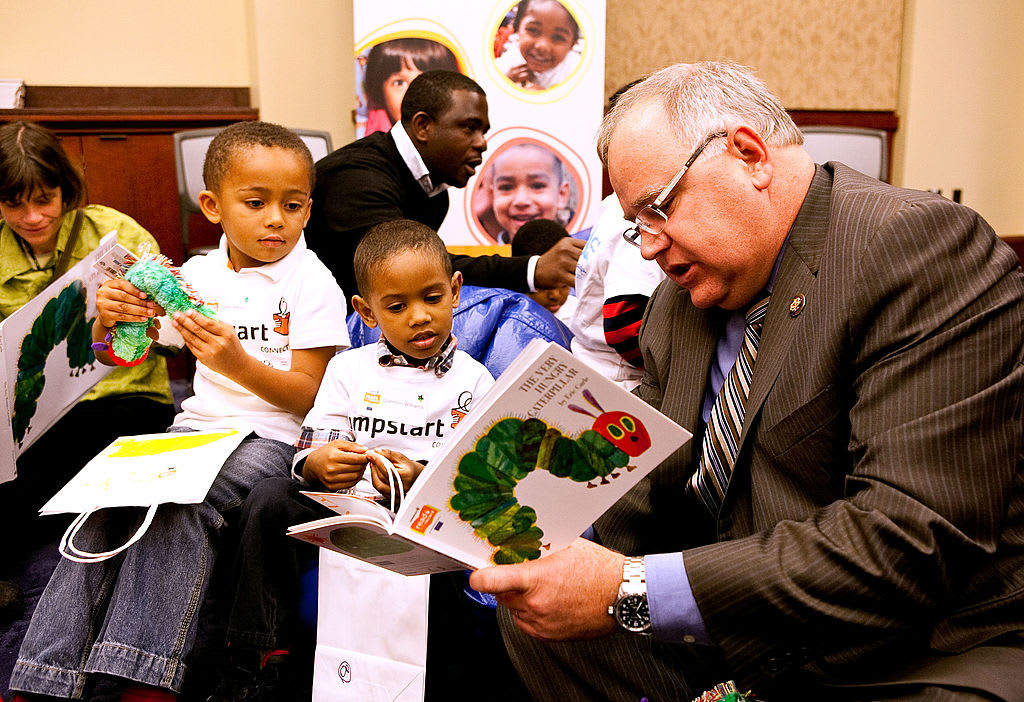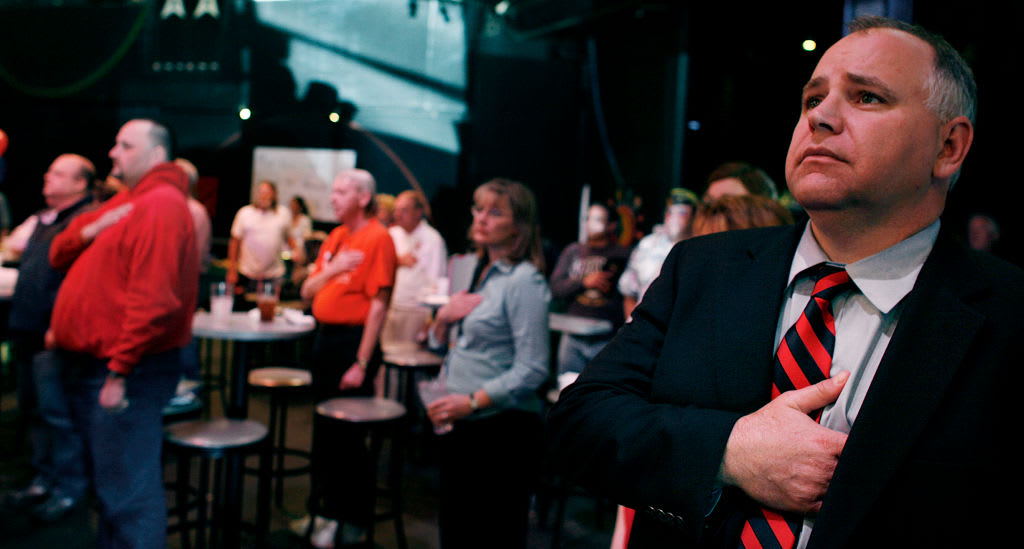When word reached Room 114 at Mankato West High School that a plane had flown into the World Trade Center, Tim Walz was beginning his geography class with the usual discussion of current events.
“He was one of the teachers who had a TV in his room, so he turned the news on, and we just followed what was happening the rest of the class period,” Megan Reeves recalled to the Daily Beast about that September morning during her sophomore year.
“I remember being confused. What was going on in the world when I was 15 wasn’t at the top of my list of things that I truly cared about all that much.”
That quickly began to change as Reeves and the rest of the class watched the North Tower burn on a wall mounted 17-inch TV in a Minnesota town 1,230 miles away. They saw a second plane appear and fly into the South Tower.
“That kind of hyped everybody up a little bit more, made it more serious, a little bit more scary, and [Walz] just stayed calm the entire time,” she recalled. “I remember him reassuring us that we were the strongest country in the world and we shouldn’t worry because we were safe at that moment in time.”
Reeves added, “I guess I was a little scared. We’d learned about wars in class… And this is like the first time when I’m alive.
“But I remember feeling also very safe and protected being in his classroom, because he was so calm about it, whereas the students were freaking out a little bit.”
Reeves says she was further steadied by the knowledge that Walz was in the Wisconsin National Guard. She figures this was partly the reason students who were not in the class came into his room. They included Keenan Robbins, a senior who had been in study hall when he first learned of the history-altering events of that morning. .
“A friend of ours came in and said, ‘Hey, you know, this crazy thing has happened, let’s go check it out.’”
He and several fellow seniors passed other classrooms that had TVs, but continued on to Room 114.
“I think it’s not by chance that we ended up in Mr Walz’s room that morning,” Robbins said. “Of the handful of seniors who ended up there, none of us were technically in his class that morning, but we knew we’d get an honest assessment of a complex situation and we knew he wouldn’t ask us ‘where are you supposed to be right now?’”
Robbins had not seen the first plane hit, but he saw the second.
“I said, ‘Is this a replay?” he remembers. “Everybody’s like, ‘No, this is, this is a second plane.’ So that sort of changed the tenor of the event, for sure.”

Then-Congressman Tim Walz reads to children on Capitol Hill in 2009 in Washington, D.C.
Paul Morigi/Images for Jumpstart via Getty Images
At one point, Walz saw Ben Ingman, a senior who lived in the house behind his, passing in the hallway.
“He walked up and grabbed me by the shoulders and said, ‘A plane just crashed into the World Trade Center,’” Ingman told the Daily Beast.
Ingman did not have Walz as a teacher that year. But Walz was still Walz and Ingman went into Room 112.
“Tim had a way of making people feel safe, and that just kind of came through in a moment of extreme uncertainty,” Ingman said. “It felt right to be there.”
Ingman and Robbins and Reeves and the other students quietly discussed the terrorist attack small groups. Walz went from one to the other.
“I remember him just sort of bouncing back and forth between groups,” Robbins says. “There wasn’t, like, any big speech from the front of the room. But when he was talking to us, he’s like, ‘You know, this, this is for real, things are going to change.’ And obviously he didn’t foresee the war on terror and the next 20 years of US foreign policy or anything like that. But he’s like, “I’m going to get called up, There’s going to be some sort of change in how we’re doing things.”
With each new development on the TV, Walz ducked next door to Room 112, where Scott Jordan was teaching AP U.S. History. Jordan had begun the day by showing a documentary film on turn-of-the-century America when Walz calmly brought the first news of a plane striking the World Trade Center.
“We turned off my documentary, we turned the TV on, or watched our TV a little bit,” Jordan recalled. “I thought, Geez. I remember from American history that a bomber during World War II hit the Empire State Building.’’

Then-congressional candidate Tim Walz stands for the national anthem while attending a meeting of Disabled American Veterans in Rochester, Minnesota.
Jerry Holt/Star Tribune via Getty Images
And that had been an accident. He figured this was as well.
“It’s like that’s tragic, that’s very sad, but we need to get back to what we do. Let’s get back to learning,’” Jordan remembers.
A few minutes later, Walz ducked back in to tell Jordan about the second plane.
“And now this is something qualitatively different,” Jordan recalls.
Jordan turned the TV back on. Walz returned a few minutes later.
“Mr. Walz comes in, and he said, ‘They’ve just hit the Pentagon,” a student named Doug Vose recalls. “He said, ‘You guys need to pay attention to this. Your generation is going to be dealing with this. Pay attention. This is history.”
Voase adds, “I think that he understands what was under attack that day was our everyday life. That people hate us for being Americans. That’s what it felt like they were attacking. They’re attacking a Norman Rockwell painting, the white picket fence sort of idea.”
Jordan remembers Walz was speaking as a soldier—in addition to his role as a fellow teacher.
“Tim was a sergeant major in the Minnesota National Guard,” Jordan says. “And so he said to me at that moment on 9/11, ‘We’re at war. I’m going to be called up. I’ve got to go talk to the principal.’ And I think he said to me, ‘Would you watch my class? Because I could be called up right away. I’ve got to be ready to go. I’ve got to go talk to the principal.”
Jordan stepped next door to Room 112 and told Walz’s class that everything was fine and he would be next door if they needed him.
“I went back to my classroom and we watched TV,” Jordan recalled. “And we basically watched TV for the next two or three days in most of the classes, until the principal finally said: ‘Stop watching.”
Walz was not immediately called to active duty and he resumed teaching geography, now with extended current events.
“Basically everybody remembers either having a parent or a grandparent or something in a war. So we talked a lot about stuff like, ‘Is it going to be like the olden days, where if you’re 18 or older, you’re just automatically going, or do you get to sign up? Is it really going to be a war like how it had been in the past, World War II, the Civil War, things like that?
“So we talked a lot about how this would be similar, yet vastly different than any other war we had experienced before.”
Walz’s battalion was deployed to Italy in 2004 in support of the American effort in Afghanistan. Jordan, whose wife was in the Navy, deployed aboard a ship that transported the first Marines into Afghanistan, remembers that Walz was in favor of the fight there. But Walz opposed the war in Iraq, which he decided had been launched on a bogus pretext involving non-existent weapons of mass destruction.
“He was just extremely offended by the Iraq war, that seems to be uncalled for, unnecessary,” Jordan recalls.
In March of 2005, Walz’s battalion was notified it might be deployed to Iraq within two years. He had already put in his papers to retire after 24 years. It became official that May.
His unit was deployed in July and some of his fellow sergeant majors grumbled that he had shirked his duty.
His opposition to the war in Iraq led him into politics. He ran for Congress and won as a Democrat in a red district.
Walz went on to become governor—and is now the Democratic candidate for vice president.
His years as an assistant football coach certainly has not hurt his prospects. Neither did the qualities that he demonstrated on 9/11.
“Some of the descriptions that I’ve heard of Tim as being the happy warrior are absolutely true. I mean, this guy, you know, he’s not a perfect human being. None of us are. But at that moment in time, he was absolutely ready to go to or to be called up to defend his kids, our school, our community and this nation, to do whatever he was asked to do, and he needed to communicate that immediately to principal, because he also held an obligation to the school, to his students, to his classes. And I remember that very simply.”
Jordan added, “I will never forget that moment of the Minute Man.”




![Tyson Foods Plant [Photo: Food Manufacturing]](https://southarkansassun.com/wp-content/uploads/2023/08/iStock_1185520857__1_.5e441daa51cca-600x337.jpg)








![Silverado Senior Living Management Inc. [Photo: Los Angeles Times]](https://southarkansassun.com/wp-content/uploads/2023/10/download-6-4-600x337.jpg)

![China's Wuhan Institute of Virology [Photo: Nature]](https://southarkansassun.com/wp-content/uploads/2023/09/d41586-021-01529-3_19239608-600x337.jpg)















